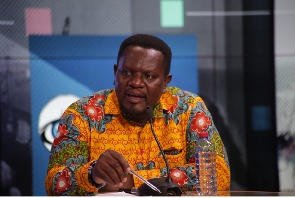 Executive Director, APN Group, Louis Yaw Afful
Executive Director, APN Group, Louis Yaw Afful
Almost three years since the inaugural commencement of trade under the Africa
Continental Free Trade Area, not much trading has been done.
Several factors could be attributed to this underwhelming degree of trade among African countries. An obvious one is insufficient production capacity. Many trade experts and pundits have expressed dissatisfaction with the inability of Africans to establish value chains that would maximize the manufacturing and exportation of originating goods.
One of such people is Louis Yaw Afful, Trade practitioner and Executive Director
of the AfCFTA Policy Network Group.
According to him, “It’s about time we hear the machines sounding”.
He was speaking on the industry-specific Eye on Port program about the importance of ports for the Successful Implementation of AfCFTA.
He said it’s about time to move past the literature and take action on the ground so far the free trade is concerned.
Mr. Afful opined, “Until we develop our value chains to encourage
industrialization, until heard the sounds of factories producing,” the AfCFTA
the concept will remain in its honeymoon phase.
He said African states by now, should be sure of their priority products and develop competitive value chains that will take advantage of and feed the large market block.
According to the AfCFTA expert, “It seems African countries don’t recognize the
particular sector they are dominant in, be it agribusiness or the service industry. Most of the economies in Africa are into agribusiness. That tells us we should quickly look into the next step for industrialization and manufacturing. Until we produce, we will continue to import from outside.”
He said from his observation, that African governments seem to have neglected total factor productivity in their national strategies for competitive trade under AfCFTA.
He expressed disappointment in how much share of shelf space African products enjoy in retail stores on the continent.
What’s worse he said, “It’s hard to find a francophone product in an English-speaking African country and the other way round.”
He said Africa is struggling to penetrate its market because the continent is still struggling with the fundamentals of free trade which hinge on accelerated production backed by an enabling environment.